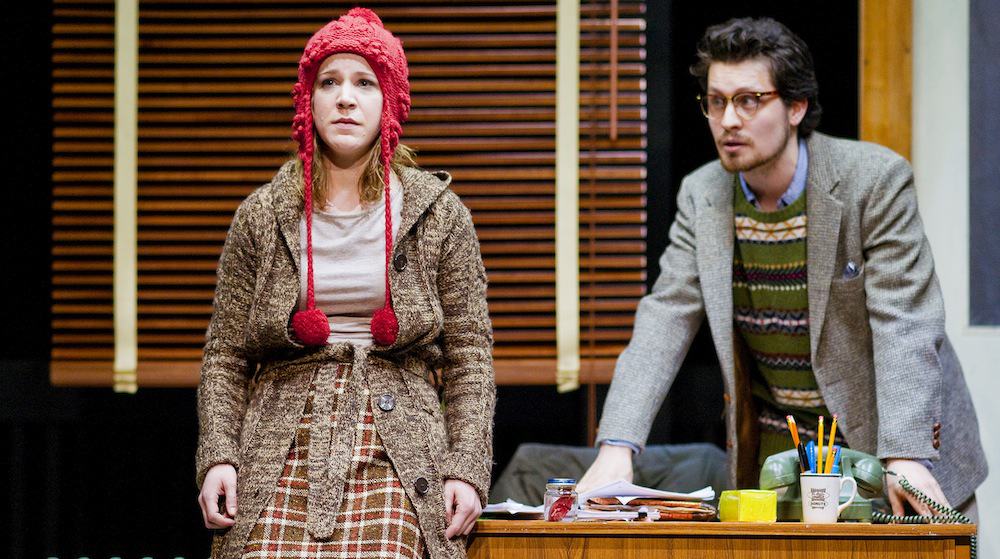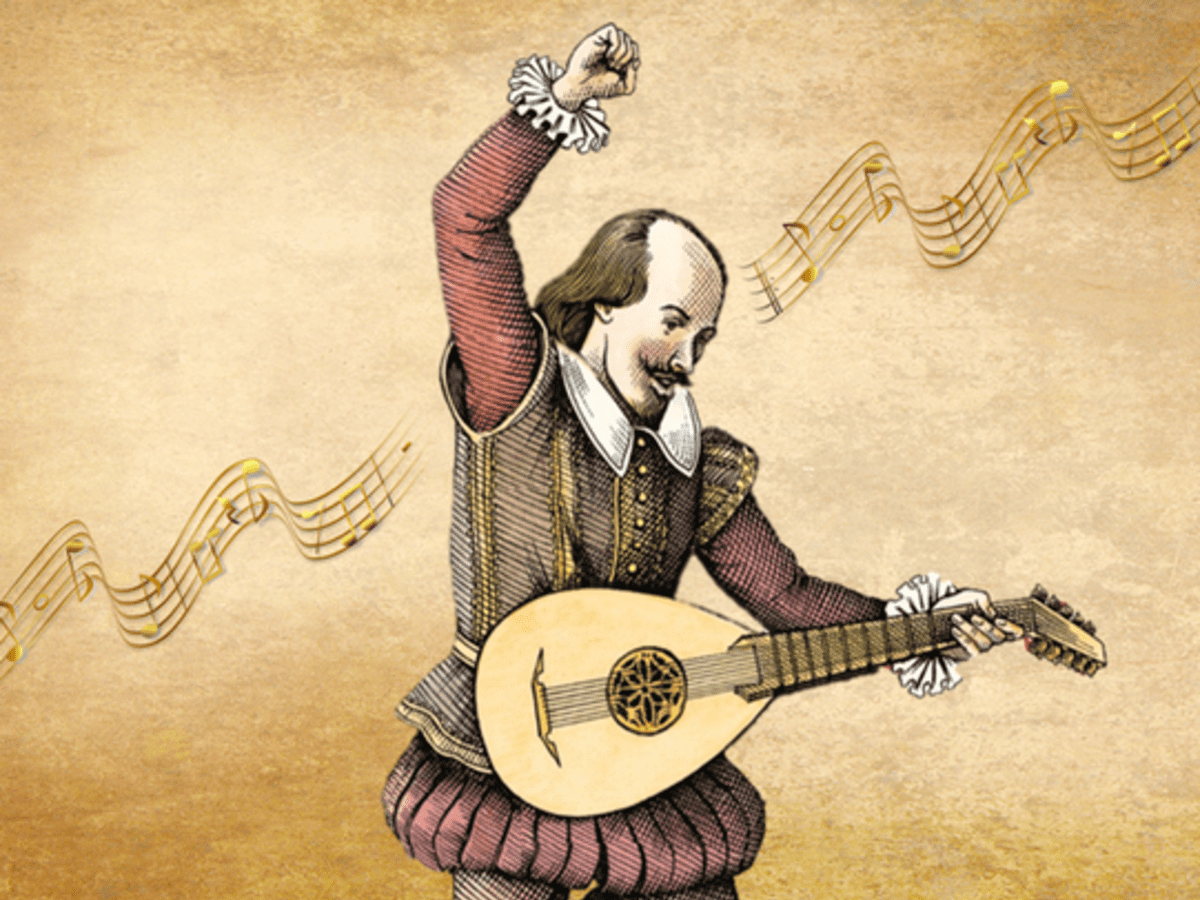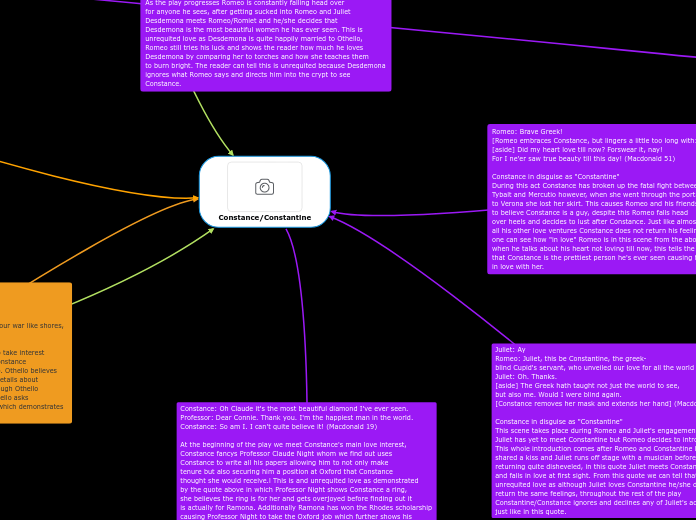Desdemona: How shall I kill her Iago?
[Iago hands Desdemona the pillow] (Macdonald 49)
In Shakespeares original play Othello, Iago tries to bring about Desdemona's
downfall by convincing Othello to kill her. In the above quotation, we can see this
relationship between Iago and Desdemona,when Iago talks about killing Desdemona
it reinforces that he does not like her and that she is in the way of his plans. This shows
how manipulative Iago is in both the original play and this play as just like in the original
he manipulates someone into strangling someone with a pillow.
Constance: That sounds like Troy
Iago: [aside] Not Troy, but false.
Constance: And Desdemona fell in love with you,
because she loved to hear you talk of war.
Othello: These things to hear she seriously inclined.
(Macdonald 26)
Throughout this whole play we often hear about Desdemona's
love for war, it comes up not only in her marriage to Othello
but also her friendship with Constance. Despite the fact that
Constance does not enjoy anything gruesome Desdemona
constantly suggests going to watch battles or go pillage the ruins,
in this quote, Othello is telling Constance how he fell in love
with Desdemona. Constance deliberately states that Desdemona fell
in love with Othello due to his war stories which tells the reader she
is in love with the idea of war.
Desdomona: O valient general and most bloody lord!
Othello: O my fair warrior!
Desdemona: My dear Othello!
Constance: Divine Desdemona!
Othello: My better self!
(Macdonald 27)
In this particular play, Othello came dangerously close to killing
Desdemona, but once Constance intervened, he and Desdemona
hugged and appeared to overlook that fact. Despite the fact that
Desdemona was about to be killed as a result of Iago's trickery, they
continued to exhibit affection and care for one another. Desdemona
still has feelings for Othello despite this. Desdemona is arriving
in this passage following the fight between Othello and Iago.
Desdemona makes Othello a better person since he refers to her
as his fair warrior and says that she represents his better self. On
the surface, they are able to keep up a love connection with mutual appreciation.
Given that Othello wouldn't think so highly of Desdemona if there wasn't
romance, this conclusively demonstrates the romance.
Romeo: Hold Tybalt! Good Mercutio!
(Macdonald 50)
Not much is actually said about between/about
Mercutio and Romeo in this play, we know from Romeo
and Juliet that the pair are best friends however with
Constance intervening in the sword fight causing it to end
before the fatality Romeo and Mercutio's relationship does
not evolve as deeply. We do get a glimpse into their friendship
from the above quote when Romeo cheers Mercutio on in the fight,
because Romeo is encouraging Mercutio one can assume that they are
friends who care about each other. In addition it is stated in the text
that Romeo watches in pain as the fight takes place which
further tells the reader he cares about Mercutio.
[Desdemona raises the pillow]
Constance: No! No way, I swear!
[The pillow comes down again. Juliet grabs another pillow and offers it to Desdemona]
Juliet: Kill me in her stead (Macdonald 80)
Whilst reading the play one may notice Juliet has a rather strange obsession to death,
Juliet constantly brings up dying to or with Constantine and whenever
her life gets difficult she turns to ending her life. A prime example of this obsession is
seen when Desdemona is transported into Romeo and Juliet and proceeds to try and
suffocate Constance/Constantine, instead of trying to save the supposed love of her life
Juliet instead tries to get Desdemona to kill her too. This scene is demonstrated in the
above quote, and when the stage directions "Juliet grabs another pillow
and offers it to Desdemona" it tells the reader just how obssesed she is.
Nurse: What Juliet, ladybird, what little maid!
Juliet: [Aside] No maid but matron, thus made and unmade.
[Nurse enters. She is hot and puffing, carries a gift-wrapped package]
Nurse: Another gift for thee my lamb. Beshrew this heat, Verona is ablaze!
'T'will be tomorrow fourteen years ago since thou wert born upon a wave
of heat that cooked the country, marry, ash.
Child look, I have a pretty box for thee. (Macdonald 56)
Constance in disguise as Constantine
After spending a passionate night with Romeo the newly married pair have a huge fight
that ends in Romeo leaving to go find Constantine, after he leaves Juliet's nurse
enters carrying presents to celebrate the pairs engagement. The love between Juliet and
her nurse is a maternial love and can be seen exibited in the play in the quote above
when Juliet confides in the nurse, in this quote we see the nurse comforting Juliet in
her time of need just as a mother would do. Moreover Juliet's nurse even tries to cheer
her up by offering her some of the engagement presents as a distraction, based on these
moments we can tell that the pair care for and love each other in a maternal way.
Juliet: Boy, wherefore is thy voice so sweet and high?
Servant: For that I sing Castrato, lady.
Juliet: Oh. Hast thou a brother that's a tenor?
Servant: Ay ma'am. [points off] Look where he tunes his instrument.
Juliet: [exiting] So tune I mine, to pitch in sweet duet.-(Macdonald 60)
Yet another example of love in this play that happens during the engagement
party for Romeo and Juliet is between Juliet and a servant/musician, after having
a huge fight with Romeo Juliet attends the party and catches the eye of a musician
at the party. The pair begin to flirt with each other before running off stage passionately,
Juliet later returns looking "disheveled" showing that this is lust/young love between the 2
characters as both parties were flirting with each other. The above quote depicts the flirting
between the pair and shows that they are both lusting after each other.
Professor: Neither will Ramona.
Constance: Ramona?...Oh.
Professor: I'm going to miss you Connie.
Constance: Am I going somewhere? (Macdonald 19)
This scene takes place right after Constance finds out
Professor Night is planning on proposing to Ramona, she
then finds out Professor Night is taking the Oxford job
in order to be close to Ramona. Although this event is
soul-crushing for Constance it shows how much Professor
Night loves Ramona, Macdonald never states if Ramona
feels the same however we can infer she does because
Ramona mentions Professor Night knowing/caring about
her Rhodes win.
Juliet: Ay
Romeo: Juliet, this be Constantine, the greek-
blind Cupid's servant, who unveiled our love for all the world to see.
Juliet: Oh. Thanks.
[aside] The Greek hath taught not just the world to see,
but also me. Would I were blind again.
[Constance removes her mask and extends her hand] (Macdonald 63)
Constance in disguise as "Constantine"
This scene takes place during Romeo and Juliet's engagement party,
Juliet has yet to meet Constantine but Romeo decides to introduce them.
This whole introduction comes after Romeo and Constantine have
shared a kiss and Juliet runs off stage with a musician before
returning quite disheveled, in this quote Juliet meets Constantine
and falls in love at first sight. From this quote we can tell that this is an
unrequited love as although Juliet loves Constantine he/she does not
return the same feelings, throughout the rest of the play
Constantine/Constance ignores and declines any of Juliet's advancements
just like in this quote.
Constance: Oh Claude it's the most beautiful diamond I've ever seen.
Professor: Dear Connie. Thank you. I'm the happiest man in the world.
Constance: So am I. I can't quite believe it! (Macdonald 19)
At the beginning of the play we meet Constance's main love interest,
Constance fancys Professor Claude Night whom we find out uses
Constance to write all his papers allowing him to not only make
tenure but also securing him a position at Oxford that Constance
thought she would receive.l This is and unrequited love as demonstrated
by the quote above in which Professor Night shows Constance a ring,
she believes the ring is for her and gets overjoyed before finding out it
is actually for Ramona. Additionally Ramona has won the Rhodes scholarship
causing Professor Night to take the Oxford job which further shows his
lack of care for Constance.
Constance: What can you do?
Desdemona: Gird thou thy trembling loins, and slay
Professor Night!
Constance: I'm guilty too: I helped him in deceiving
Queens's for years.
Iago: [Aside] This will serve my turn upon the pedant
(Macdonald 37)
When talking to Desdemona about her love interest
Professor Night, Constance is overheard by Iago. Just
like in the original play Iago is trying to bring about
the downfall of Desdemona but when he is foiled by
Constance Iago decides to get Desdemona to turn against her.
In the above quote Iago overhears how Constance has been
deceiving Queen's, he decides to use this to turn Desdemona
against Constance showing his manipulative personality and
hatefulness towards Constance.
Iago: Tell me but this:
Have you not sometimes seen a handkerchief
spotted with strawberries in your wife's hand?
Othello: I gave her such a one; but such a handkerchief-
I am sure it was your wife's-did I today see Cassio wipe his beard with.
Othello: If it be that-
Iago: If it be that, or any that was hers
it speaks against her with the other proofs. (Macdonald 23)
In this play and in the original play all Iago seems to do is manipulate
people for his own personal gain, this scene is from the original play
and is right before Constance interrupts which saves Desdemona. During
this section of the play Othello and Iago have quite the trusting relationship
which Iago uses against Othello, this trust allows Iago to manipulate Othello
and almost leads to the death of Desdemona.
Romeo: Poseidon be thanked! Hector lives to fight another day!
Juliet: Be Lazarus from this day forth, thou risen turtle.
[they shower the turtle with loving kisses] (Macdonald 55)
One of the most important characters in the whole play is Hector,
Hector is the pet turtle that Romeo and Juliet share together. Hector
is a great example of true love between characters as Romeo and
Juliet both adore him, when the stage directions state "[they shower the turtle
with loving kisses]" it tells the reader that they both really love Hector. This
kissing is especially important when we compare it to Romeo and Juliet
who did a forced peck on the cheek. Hector not only helps the reader
better understand Romeo and Juliet's relationship but he is also
a fun comedic relief.
Romeo: [Aside] O, she doth teach the torches to burn bright!
Desdemona: Constance doth await us at the Crypt, ma'am.
Romeo: I am no ma'am, but man, and worship thee.
(Macdonald 83)
Romeo in disguise as "Romiet"
As the play progresses Romeo is constantly falling head over
for anyone he sees, after getting sucked into Romeo and Juliet
Desdemona meets Romeo/Romiet and he/she decides that
Desdemona is the most beautiful women he has ever seen. This is
unrequited love as Desdemona is quite happily married to Othello,
Romeo still tries his luck and shows the reader how much he loves
Desdemona by comparing her to torches and how she teaches them
to burn bright. The reader can tell this is unrequited because Desdemona
ignores what Romeo says and directs him into the crypt to see
Constance.
Othello: Stay!!!
Constance Sure.
Othello: Forty-thousand lives were not enough
to satisfy my debut to you, strange friend.
I'd keep you on this island till I knew which angel beached you on our war like shores,
and how you gained fair knowledge of foul deeds. (Macdonald 25)
During this scene Constance has foiled Iago which cause Othello to take interest
in her, Othello starts what could be considered a friendship with Constance
however it appears as though he has more power in this friendship. Othello believes
Constance is some type of all knowing oracle because she knows details about
his and Desdemona's marriage, this quote demonstrates that although Othello
and Constance are friendly he has more power over her. When Othello asks
Constance to stay she immediately obliges without much thought which demonstrates
the power Othello has in this relationship.
Romeo: Brave Greek!
[Romeo embraces Constance, but lingers a little too long with:]
[aside] Did my heart love till now? Forswear it, nay!
For I ne'er saw true beauty till this day! (Macdonald 51)
Constance in disguise as "Constantine"
During this act Constance has broken up the fatal fight between
Tybalt and Mercutio however, when she went through the portal
to Verona she lost her skirt. This causes Romeo and his friends
to believe Constance is a guy, despite this Romeo falls head
over heels and decides to lust after Constance. Just like almost
all his other love ventures Constance does not return his feelings,
one can see how "in love" Romeo is in this scene from the above quote
when he talks about his heart not loving till now, this tells the audience
that Constance is the prettiest person he's ever seen causing him to fall
in love with her.
[Romeo places his hand on Tybalt's bottom. Tybalt whirls about, yanks Roneo's eye
mask forward, and lets it snaps back when he recognizes him]
Tybalt: Ah, Romeo, 'tis thee my cuz!
Romeo: Tybalt! I knew 'twas thee. (Macdonald 60)
Whilst at his own engagement party Romeo when looking for Constantine
ends up smacking Tybalt's butt, Romeo tries to play this event off
saying he knew it was Tybalt. This scene represents Romeo and
Tybalt's friendship/family connection because it shows how
comfortable they are with each other, throughout this whole scene
the boys constantly refer to each other as "cuz" and act very
playful with each other. Although at the start of the play their relationship
was rocky once they found out that they were family the boys instantly
bonded and put all the hate in the past.
Tybalt: What maiden corse lies fest'ring here for crows to peck?
[Romeo reaches up and pulls Tybalt toward him]
Ha-ha! No corse but fresh, and laid out for the pecking.
[Tybalt picks Romeo up and carries him off, ardently.]
(Macdonald 84)
Romeo in disguise as "Romiet"
During the boneyard scene Tybalt comes to check on Constantine
to make sure she is actually dead, when Tybalt here's someone
he hides before discovering Romeo/Romiet at the crypt. As we have seen
in the whole play Romeo decides to lust after yet another person,
this time his interest lies in Tybalt. Due to the fact that Romeo is in
disguise Tybalt doesn't realize it's him and puts the moves on Romeo.
We can tell this is a relationship of lust when in the quote the stage
direction says "carries him off, ardently." The word ardently means
passionately which reinforces the lust between the pair.
Juliet: I'll tell my father!
Romeo: So will I tell mine!
O wherefore did I wive a sniv'lling girl?!
[Romeo exits in tears]
Juliet: O wherefore married I a stripling boy?!
(Macdonald 56)
Constance in disguise as Constantine
The once-devoted and fixated pair falls short of their reputation.
They both already find each other boring and have developed
interests in someone else—ironically, the same person. They
no longer find their marriage to be new and exciting, which causes
a number of problems with their lack of love and affection for
one another. After spending the night together Romeo and
Juliet are not in love as they once thought, in fact,
Romeo jumps out of bed to go search for Constantine.
Before he can leave he and Juliet get in a fight over
their pet turtle Hector, the end result of this fight is the above
quotation where Romeo and Juliet insult each other showing
the reader how their marriage is falling apart. The pair hasn't
even had their engagement party and are already moving
on to someone new (Constantine)
Mercutio: [Draws] Tybalt, you ratcatcher, will you walk?
Tybalt: [Draws] I am for you. (Macdonald 49)
Right before Constance interjects in the play Mercutio and
Tybalt start to engage in a "friendly" fight, as they continue
Tybalt starts to get annoyed causing the fight to turn
dangerous. Mercutio is Romeo's best friend and he is trying
to protect his honour with this fight which adds an extra layer
of complexity to this fight, I chose this quote because it
highlights how tense the relationship is between Tybalt and
Mercutio. When Tybalt calls Mercutio a ratcatcher it is a sneer
at his name showing how bad their relationship is.
Romeo: O that I were a fountain pen within thy hand,
to spurt forth streams of eloquence at thy command!
[Romeo kisses Constance. She yields]
Tybalt: [Aside] The villain! He is hither come in spite,
to shame my cousin, Romeo, this night.
[Enter Juliet, dishevelled. Tybalt hides his rage. The kiss ends.]
(Macdonald 63)
Constance in disguise as "Constantine"
During the party for Romeo and Juliet's engagement, we find that
the pair of love birds are no longer happy. Romeo seeks out
Constantine and pulls her/him aside and heavily flirts, this is over
heard by Tybalt who then thinks Constantine is ruining his
cousins marriage. Tybalt actually refers to Constantine as the
"villain" (seen in the above quote) and decides to try and kill
Constantine in order to save the marriage of his cousins. This
who exchange causes Tybalt to despise Constance/Constantine
the rest of the play.
Constance: If only I could bring you home with me.
Desdemona: I'll anywhere with thee, myfriend.
(Macdonald 30)
In this section Desdemona and Constance instantly
bond when they first meet, which allows Desdemona
to understand more about her as a person. They become
friends after Desdemona learns that Constance protected her
from being murdered. Desdemona discovers that Constance is
autonomous, single, and a ruler at this point in the story, which
immediately piques her attention. Constance can't believe that
she is actually talking to Desdemona and in this quote she wishes
she could take Desdemona home with her, when Desdemona
agrees saying she will go anywhere for her friend. This reiterates to the
reader how they are such good friends that Desdemona will go anywhere
and to great lengths for Constance.














